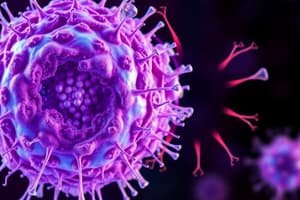Podcast
Questions and Answers
Which of the following statements is true for prokaryotic cells?
Which of the following statements is true for prokaryotic cells?
- They have a defined nucleus.
- They are characteristic of organisms like bacteria. (correct)
- They are more complex than eukaryotic cells.
- Their DNA is contained within a nuclear membrane.
What constitutes the basis of the cell theory?
What constitutes the basis of the cell theory?
- Cells can only be found in multicellular organisms. (correct)
- All cells perform the same functions regardless of type.
- Cells are the smallest living units in an organism. (correct)
- All cells arise spontaneously from non-living matter.
Which type of cell is characterized by having internal compartments for specialized functions?
Which type of cell is characterized by having internal compartments for specialized functions?
- Eukaryotic cells (correct)
- Prokaryotic cells
- Amoebic cells
- Bacterial cells
What is a common characteristic of eukaryotic cells?
What is a common characteristic of eukaryotic cells?
Which scientist contributed to the development of cell theory?
Which scientist contributed to the development of cell theory?
Which structure is found in both animal and plant cells?
Which structure is found in both animal and plant cells?
Which process is specifically associated with the creation of genetic diversity?
Which process is specifically associated with the creation of genetic diversity?
What is the primary function of mitochondria in eukaryotic cells?
What is the primary function of mitochondria in eukaryotic cells?
Which structure distinguishes plant cells from animal cells?
Which structure distinguishes plant cells from animal cells?
What role do ribosomes play in the cell?
What role do ribosomes play in the cell?
Flashcards
Prokaryotic Cell
Prokaryotic Cell
A simple cell lacking a defined nucleus, with DNA dispersed in the cytoplasm. Found in bacteria.
Eukaryotic Cell
Eukaryotic Cell
A complex cell with a defined nucleus enclosed by a membrane. Found in animals, plants, fungi, and protists.
Cell Theory Principle 1
Cell Theory Principle 1
All living organisms are composed of cells.
Cell Theory Principle 2
Cell Theory Principle 2
Signup and view all the flashcards
Cell Theory Principle 3
Cell Theory Principle 3
Signup and view all the flashcards
What does the cell membrane do?
What does the cell membrane do?
Signup and view all the flashcards
What's the cytoplasm?
What's the cytoplasm?
Signup and view all the flashcards
What does the nucleus do?
What does the nucleus do?
Signup and view all the flashcards
What's the role of mitochondria?
What's the role of mitochondria?
Signup and view all the flashcards
What is mitosis?
What is mitosis?
Signup and view all the flashcards




